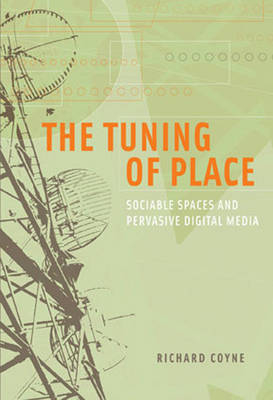
The Tuning of Place
Sociable Spaces and Pervasive Digital Media
Seiten
2010
MIT Press (Verlag)
978-0-262-01391-8 (ISBN)
MIT Press (Verlag)
978-0-262-01391-8 (ISBN)
- Keine Verlagsinformationen verfügbar
- Artikel merken
How pervasive digital devices-smartphones, iPods, GPS navigation systems, and their networks-us formulate a sense of place and refine social relationships
How do pervasive digital devices-smartphones, iPods, GPS navigation systems, and cameras, among others-influence the way we use spaces? In The Tuning of Place, Richard Coyne argues that these ubiquitous devices and the networks that support them become the means of making incremental adjustments within spaces-of tuning place. Pervasive media help us formulate a sense of place, writes Coyne, through their capacity to introduce small changes, in the same way that tuning a musical instrument invokes the subtle process of recalibration. Places are inhabited spaces, populated by people, their concerns, memories, stories, conversations, encounters, and artifacts. The tuning of place-whereby people use their devices in their interactions with one another-is also a tuning of social relations.
The range of ubiquity is vast-from the familiar phones and hand-held devices through RFID tags, smart badges, dynamic signage, microprocessors in cars and kitchen appliances, wearable computing, and prosthetics, to devices still in development. Rather than catalog achievements and predictions, Coyne offers a theoretical framework for discussing pervasive media that can inform developers, designers, and users as they contemplate interventions into the environment. Processes of tuning can lead to consideration of themes highly relevant to pervasive computing: intervention, calibration, wedges, habits, rhythm, tags, taps, tactics, thresholds, aggregation, noise, and interference.
How do pervasive digital devices-smartphones, iPods, GPS navigation systems, and cameras, among others-influence the way we use spaces? In The Tuning of Place, Richard Coyne argues that these ubiquitous devices and the networks that support them become the means of making incremental adjustments within spaces-of tuning place. Pervasive media help us formulate a sense of place, writes Coyne, through their capacity to introduce small changes, in the same way that tuning a musical instrument invokes the subtle process of recalibration. Places are inhabited spaces, populated by people, their concerns, memories, stories, conversations, encounters, and artifacts. The tuning of place-whereby people use their devices in their interactions with one another-is also a tuning of social relations.
The range of ubiquity is vast-from the familiar phones and hand-held devices through RFID tags, smart badges, dynamic signage, microprocessors in cars and kitchen appliances, wearable computing, and prosthetics, to devices still in development. Rather than catalog achievements and predictions, Coyne offers a theoretical framework for discussing pervasive media that can inform developers, designers, and users as they contemplate interventions into the environment. Processes of tuning can lead to consideration of themes highly relevant to pervasive computing: intervention, calibration, wedges, habits, rhythm, tags, taps, tactics, thresholds, aggregation, noise, and interference.
Richard Coyne is Professor and Chair of Architectural Computing at the University of Edinburgh. He is the author of four other books published by the MIT Press, including The Tuning of Place: Sociable Spaces and Pervasive Digital Media.
| Erscheint lt. Verlag | 31.5.2010 |
|---|---|
| Reihe/Serie | The MIT Press |
| Verlagsort | Cambridge, Mass. |
| Sprache | englisch |
| Maße | 152 x 229 mm |
| Gewicht | 635 g |
| Themenwelt | Informatik ► Software Entwicklung ► User Interfaces (HCI) |
| Sozialwissenschaften ► Kommunikation / Medien ► Medienwissenschaft | |
| ISBN-10 | 0-262-01391-6 / 0262013916 |
| ISBN-13 | 978-0-262-01391-8 / 9780262013918 |
| Zustand | Neuware |
| Haben Sie eine Frage zum Produkt? |
Mehr entdecken
aus dem Bereich
aus dem Bereich
Aus- und Weiterbildung nach iSAQB-Standard zum Certified Professional …
Buch | Hardcover (2023)
dpunkt Verlag
34,90 €
Lean UX und Design Thinking: Teambasierte Entwicklung …
Buch | Hardcover (2022)
dpunkt (Verlag)
34,90 €
Wissensverarbeitung - Neuronale Netze
Buch | Hardcover (2023)
Carl Hanser (Verlag)
34,99 €


